Brian Clegg's Blog, page 32
January 3, 2021
Review - The Time Traveller's Guide to Medieval England - Ian Mortimer ****
 History is one of those subjects that ought to be fascinating, but all too often is dry and dull. Ian Mortimer had the excellent idea of doing a series of 'time traveller's guide's - telling you what you will experience on a visit to medieval England (here considering roughly 1300-1400).
History is one of those subjects that ought to be fascinating, but all too often is dry and dull. Ian Mortimer had the excellent idea of doing a series of 'time traveller's guide's - telling you what you will experience on a visit to medieval England (here considering roughly 1300-1400).As you might expect, there's a fair amount of dispelling of clichés about the period, while at the same time showing that others have a reasonable basis. It really was dirty, smelly and often nasty for many, yet there was also, for example, a surprisingly high level of literacy in the middle and upper classes. The class divisions are stark and multifold, both interesting as (as we will see) producing the biggest problem for Mortimer in making this book approachable.
I was particularly shocked by the statistic that the population of England halved in the period, primarily down to a series of waves of plague. And this was in a population that seems tiny now. Mortimer lists the estimated population in 1377 of the biggest towns and cities by size. London tops the list with 40,000. By the time we're down to number 10 on the list (Boston, in Lincolnshire), it's 4,800. Cambridge, for example, struggles in at number 21 with 3,200 people - a population that we would see in a reasonable-sized village today.
Traditionally, history has been accused of focusing too much on royalty and nobles. That's all in here, but there's plenty all the way down to the lowest villein, with lots of enjoyable little details (like women not using side saddles, as we might imagine). The detail is both the book's delight and its failing. We like to get intimate little details, but Mortimer feels it necessary for each of the areas he looks at (from what to wear through to eating and drinking) to detail what what would apply for each of the levels of the hierarchy - something that after a while gets occasionally tedious. I think it might have been better had he followed a real guide book more in being prepared to just focus in on some areas (perhaps varying from topic to topic), rather than trying to be comprehensive. (My favourite old guidebook, England on 10 Dollars a Day, for example is decidedly selective on where it covers.)
What is certainly true is that this book would be a boon for anyone writing historical fiction set in the fourteenth century or thereabouts. It is wonderfully rich in detail. I did enjoy it and do recommend it - but sometimes, reading it felt just a bit too much like doing my homework.
The Time Traveller's Guide to Medieval England is available from Bookshop.org, Amazon.co.uk and Amazon.com.
December 28, 2020
Review - You Are Awful (But I Like You) - Tim Moore
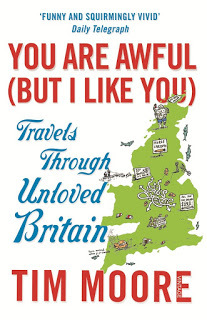 Not a biography of Dick Emery, but a humorous UK travel book, one of my favourite genres. With Bill Bryson setting the bar and Stuart Maconie managing to better Bryson's approach with a mix of wry observation and genuine affection, Tim Moore had stiff competition. The concept behind the book was to visit places that are widely considered to be awful and see what they are really like - Moore goes the whole hog by making the journey in an awful car (an Austin Maestro) with a soundtrack of awful music, choosing to eat and stay in the dregs of the rating system.
Not a biography of Dick Emery, but a humorous UK travel book, one of my favourite genres. With Bill Bryson setting the bar and Stuart Maconie managing to better Bryson's approach with a mix of wry observation and genuine affection, Tim Moore had stiff competition. The concept behind the book was to visit places that are widely considered to be awful and see what they are really like - Moore goes the whole hog by making the journey in an awful car (an Austin Maestro) with a soundtrack of awful music, choosing to eat and stay in the dregs of the rating system.There are dangers attached to this approach. Of the six places I've lived, three could well feature in such a book (though, as it happened, only one did - the one that most deserved it - and that tangentially), and I wouldn't be very happy if they got the same sort of treatment Moore gives to, say, St Helens, Rhyl and Cowdenbeath. The good side is that he gives genuinely interesting historical context to the sad state of places such as Hull or Barrow, but despite his claim to like these places, it's hard not to see at least some of his comments (and his attempts to phoneticise local accents) as typical 'Londoner snipes at the provinces'.
I'd also say that Moore's masochistic requirement to eat at the most horrible establishments he can find (or to stay in total dumps) does not help in giving a good picture of these locations. A Maconie version would have given us a warts and all view: Moore only provides warts and more warts.
The book is not uninteresting, and occasionally entertaining. I enjoyed the historical context and some good unlikely trivia (such as the comedian Roy 'Chubby' Brown's real name being Royston Vasey) - but I think the straightjacket of a format that Moore placed on himself limits the book's ability to be truly enjoyable and fails to give a fair picture of places where real people live. One thing is certain, though: if I'm ever in Middlesborough, I won't be ordering a parmo.
You Are Awful (But I Like You) is available from Amazon.co.uk and Amazon.com.
Using these links earns us commission at no cost to you
October 24, 2020
How dodgy statistics can ruin a perfectly good message about recycling
 I got a press release the other day which put across a sensible message that people often don't understand what recycling symbols on packaging mean. The sponsors of the survey asked 2,300 people the meaning of various recycling symbols - the infographic shows their results. The percentages are interesting, though not really surprising, apart perhaps from 88% not able to understand the aluminium one. (I certainly had no clue about the financial contribution one.)
I got a press release the other day which put across a sensible message that people often don't understand what recycling symbols on packaging mean. The sponsors of the survey asked 2,300 people the meaning of various recycling symbols - the infographic shows their results. The percentages are interesting, though not really surprising, apart perhaps from 88% not able to understand the aluminium one. (I certainly had no clue about the financial contribution one.)So far, so good. But the headline of the press release blares Brits Are Spending 54 Hours A YEAR Trying to Recycle. What? Where did that number come from? We are also told that 'Brits can spend up to 14.2 hours a year searching for a recycling symbol and its meaning, before deciding to give up'. Really?
The press release gives the following methodology (and full marks to them for telling us what it was - many don't):
1. SaveOnEnergy averaged a ‘big shop’ every 2.5 weeks, with 60 items brought per shop, which worked out at 20.8 ‘big shops’ a year.
2. SaveOnEnergy then timed a number of participants to find out how long it would take them to: look for the symbol and Google what the symbol meant, before giving up (average of 41 seconds) and looking for the symbol, Google what it means and keep searching until they found the correct method of recycling (average of 2 minutes, 37 seconds).
3. SaveOnEnergy then used this to work out how much time was spent looking per item, per ‘big shop’.
I did have to clarify the second point - how they got stats for both giving up and continuing. It turns out just 100 of the 2,300 participants were timed and were asked 'to let us know how long they spend looking up symbols and if they were to give up (because it took too long) then to be honest and let us know - out of those (38) who did look and give up, it averaged at around 41 seconds, for those (62) who kept looking until they found the right instruction (checking local council website…etc), it took on average 2 minutes and 37 seconds.'
Okay. But there's one huge flaw here. Remember Brits Are Spending 54 Hours A YEAR Trying to Recycle - not a single person said they do this. And even if they did try to look up the symbols, who would do it for every item in their shop every time? Personally, I just follow my local authority guidance - I don't pay attention to the symbols at all, and I've never looked one up. Even if I did, say, look up four or five of them, we're talking ten minutes, not 54 hours.
So, yes, there's a sensible message here. Many of those symbols are pointless. Maybe we could come up with a more intuitive set. But for goodness sake, people, please don't use horribly distorted statistics to try to make the point. (Oh, and I'd rather not be called a 'Brit' - but that may be just me.)
October 15, 2020
Wild and Game - review
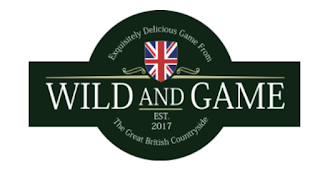 Like a lot of people during lockdown, when supermarket deliveries were like gold dust, we found a number of alternative sources for food. Most of those have now gone by the wayside, but one that is a continued favourite is Wild and Game.
Like a lot of people during lockdown, when supermarket deliveries were like gold dust, we found a number of alternative sources for food. Most of those have now gone by the wayside, but one that is a continued favourite is Wild and Game.This is a non-profit with the aim of making game meat more accessible. Obviously not a lot of interest if you are vegan/vegetarian, but if you eat meat I'd highly recommend giving them a try. Apart from anything else, game has arguably significantly better animal welfare than other meats and tends to be lower in fat. But, to be honest, my main reason for recommending them is their products are so good.
We're particularly fans of their brilliant patés, which are up to anything you'd get in a posh restaurant, along with their sausages, burgers, various venison products and game bird fillets. If you're into pies, they also have an excellent range of these. We started with one of their variety packs, but it's we'll worth having a look around the site.
I ought to say that I don't have any affiliation with Wild and Game or make anything from this recommendation - they're just too good not to pass it on.
October 2, 2020
How to Be a Well Being - review
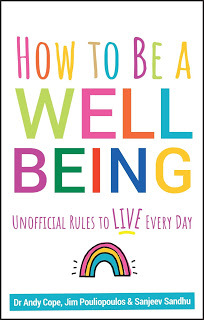 My natural inclination on encountering a self-help book is to cringe - but I have to admit I rather enjoyed How to Be a Well Being by Andy Cope, Jim Pouliopoulos and Sanjeev Sandhu. It's amiable, quirky and doesn't take itself too seriously (a common fault of many such books).
My natural inclination on encountering a self-help book is to cringe - but I have to admit I rather enjoyed How to Be a Well Being by Andy Cope, Jim Pouliopoulos and Sanjeev Sandhu. It's amiable, quirky and doesn't take itself too seriously (a common fault of many such books).Inside we find 22 (a strange number) lessons or rules for life, each getting a short section that gives us some detail, some thoughts on addressing the lesson and often a story of personal experience from one of the authors. Although the authors touch on spirituality occasionally, there is no resorting to woo, mindfulness and other such stuff (despite the dubious term 'wellbeing') but, rather, sensible observations on life.
One way to look at these 22 sections is a series of short sermons for those who don't go to church - little contemplations on something important to our lives. It's interesting how many of the rules are obvious. We all really know them. So we get, for example, things like 'seize the day' (without using those exact words), 'life isn't fair', the benefits of saying 'thank you' and the importance of getting enough sleep and eating well most of the time. Another way of looking at these rules is as the set from which most people choose their New Year resolutions (if they have them). Unfortunately, of course, most who do make New Year resolutions break them pretty quickly, which I suppose is why there needs to be more than one self-help book in the world.
Overall, then, it may be obvious stuff - but it's obvious stuff most of ignore much of the time. And it can't be a bad thing to get occasional reminders of the little things which can genuinely make our life better.
On the downside, I found the authors' relentless jokiness rather wearing. The book has the same tone as something like Horrible Histories, which works well for children, but can feel a bit heavy going for an adult reader. Also, while I'm happy to give the book 3 out of 5 stars, which is probably the most I would ever give a self-help book, I very nearly reduced that to two stars for one reason. One of the authors, Andy Cope, has a PhD. Where the other authors refer to themselves as Sanj and Pouli, Cope calls himself 'Dr Andy'. I'm sorry, that just feels uncomfortable to read - it's hard to trust someone who calls himself Dr Andy.
One other disappointment. The book opens by tell us this is a book for NOW (sic) because the world has changed due to the pandemic. I had hoped that meant the rules would give specific reflection on the impact of coronavirus on our lives and how to deal with it. In practice this seems to have been bolted on at the last minute as the pandemic isn't mentioned again.
Do you need this book? Quite possibly, because we are so bad at picking up on these simple but really helpful points in our life. Will it change the way you live your life? Experience suggests, no. But it's worth having a go.
How to Be a Well Being is available on Amazon.co.uk and Amazon.com.
Using these links earns us commission at no cost to you
Crow Investigations Series - review
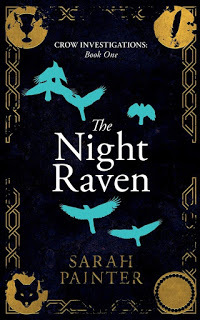 I have become very fond of a distinctly niche genre - urban fantasy crime fiction. Books by Paul Cornell (Shadow Police) and Ben Aaronovitch (Rivers of London) combine magic in a present day world with a police procedural to make a fascinating and fun read. Having exhausted their output so far, I was looking for something else on the same lines and came across Sarah Painter's four books (to date) in the Crow Investigations series, starting with The Night Raven.
I have become very fond of a distinctly niche genre - urban fantasy crime fiction. Books by Paul Cornell (Shadow Police) and Ben Aaronovitch (Rivers of London) combine magic in a present day world with a police procedural to make a fascinating and fun read. Having exhausted their output so far, I was looking for something else on the same lines and came across Sarah Painter's four books (to date) in the Crow Investigations series, starting with The Night Raven.Although not strictly police procedural (the main character, Lydia Crow is a private investigator rather than a cop), this London-set series combines crime and magic with a genuinely original and delightful scenario. There are four 'magical families' in London with special abilities who have used these abilities to further their families fortunes - sometimes legally, sometimes otherwise.
Lydia is part of the the somewhat dodgy Crow family, but has been brought up out of the family circle and has just moved back to London to be dropped back into things in a big way. There are some lovely details - for example her coin (read the book for an explanation) - and Lydia's unlikely assistant, whose role grows through the series.
I will certainly continue to read these books, but they aren't quite up to the level of the other two mentioned above. This is because Sarah Painter drags out the action - arguably there is really only enough material for two books here. Lydia is constantly refusing to pay any attention to information that is essential to carry the plot forward - hardly a great characteristic for a P.I. Nonetheless, there's a rich inventiveness here, and things do pick up speed a little by book four. So, a worth addition to the field.
The Night Raven and its sequels are available from Amazon.co.uk and Amazon.com.
Using these links earns us commission at no cost to you
September 26, 2020
Big number statistics and press release journalism
 Photo by Martijn Baudoin on UnsplashOn Friday I was in the car from 7 to 9, so listened to two hours of the Today programme. I was getting increasingly irritated as the BBC's economics editor, Faisal Islam was repeatedly played reporting on the news that the British Retail Consortium (BRC) had stated that a no-deal Brexit would result in £3.1 billion a year in tariffs on EU food. There was no analysis, just the big number and a couple of other shocking figures like a 57% tariff on the import (sic) of cheddar cheese.
Photo by Martijn Baudoin on UnsplashOn Friday I was in the car from 7 to 9, so listened to two hours of the Today programme. I was getting increasingly irritated as the BBC's economics editor, Faisal Islam was repeatedly played reporting on the news that the British Retail Consortium (BRC) had stated that a no-deal Brexit would result in £3.1 billion a year in tariffs on EU food. There was no analysis, just the big number and a couple of other shocking figures like a 57% tariff on the import (sic) of cheddar cheese.One of the main rules of good reporting of statistics is that you don't just give a big number, but that you put that number into context - and when dealing with a forecast, it's essential to explain the assumptions that lie behind that forecast.
I looked on the BRC website and found the press release that contained all the information in the BBC's report. It also gave no context and no details of the assumptions. Worse, it gave no way to dig into the data behind the press release.
One useful way to give context to that £3.1 billion figure, which is pretty much meaningless as a comprehensible number, is to get an average per household. The UK has around 28 million households. So £3.1 billion a year is, on average, £110 a household per year. Perhaps more meaningfully to the way we food shop, that's around £2.10 a week. Obviously something no one wants to pay, but perhaps not as scary sounding as £3.1 billion.
The reason I'm concerned about assumptions is that we have no idea, for example, what assumptions were made about changes of purchasing patterns. So, for example, if EU cheddar cheese became really expensive, would those who buy EU cheddar cheese (boggle) switch to a cheaper British cheese? The cheddar example is a dramatic one, but almost anything we buy from the EU may have cheaper alternatives. In fact, they may not even be the same type of product.
One of the best illustrations I've heard of the importance of not only considering direct substitutions was a discussion with an executive at a major car company - I think it was Mercedes - who said that it was missing the point to think that competitors for the cash of buyers of their £100,000+ vehicles were necessarily other car manufacturers. It was just as likely to be, say, a yacht manufacturer or a swimming pool company. Of course, we're not dealing with these here, but if, for example, beef mince had a 48% tariff imposed (another of the examples from the press release), while some would switch to British mince, others might switch to, say, Quorn.
UPDATE 26/9/20 12:21 - Many thanks to the BRC for a very rapid response to a query (at the weekend too!) They responded 'Calculations were taken from supermarkets together accounting for almost half the UK grocery market, and were then upscaled to account for the rest of the market. We did not try and calculate substitution effects (which might lower total tariff cost) or how domestic suppliers would change prices (which would likely increase), simply because it would be almost impossible to calculate.'
I take the point it would be difficult to forecast substitution effects, but the surely should have made clear that there was no attempt to do so, meaning the £3.1 billion figure had little basis in reality.
Please note that this piece is not about Brexit and its impact. Whether or not you are happy to pay the price that Brexit will indubitably put on us, the point is about how numbers are presented in a way that best informs the public. It's about time it was done better.
July 14, 2020
A Farewell to Schedules
 The COVID-19 change in lifestyle seems to have accelerated something that has been coming for a while - we have now entirely abandoned watching TV at the broadcast time, and, for the most part, only stream programmes.
The COVID-19 change in lifestyle seems to have accelerated something that has been coming for a while - we have now entirely abandoned watching TV at the broadcast time, and, for the most part, only stream programmes.The only things we don't stream are any programs we want to watch on ITV or Channel 4 - these are recorded on a PVR (digital personal video recorder) so we can skip through the adverts. But for the rest, which is a mix of BBC iPlayer, Netflix, Britbox and Amazon Prime, it's streaming all the way. This means we spend most of our TV watching time using the excellent Apple TV box - again, it's only for ITV and Channel 4 we have to switch back to the PVR, and currently, in the summer desert of interesting new material, such times are few and far between.
There's a wonderful freedom to moving away from the schedules. If we want to watch, say, three episodes of Mrs America on the BBC in a row, we can. Or to simply ignore something for a few days and then come back to it without worrying if it recorded okay.
I've long argued that the BBC needs to move from a legally enforced licence fee to a subscription model. This new way of viewing emphasises this even more. I'd happily pay an iPlayer subscription to do away with the need for the licence fee - and it just makes so much more sense. I was delighted that in his excellent book The Nanny State Made Me , Stuart Maconie also argues for moving away from the licence fee. His reasoning is different from mine, but equally valid. Maconie points out that the licence fee means that the BBC ends up pumping out loads of trash because it has to be everything to everybody, where a subscription would enable it to do what it does best and only that.
I read a ridiculous article by Polly Toynbee the other day claiming 'The government’s next assault [after the BBC stopped providing free licences for over-75's] is their proposal to decriminalise non-payment of the TV licence, effectively making it voluntary.' What? So is she saying it's voluntary to pay for everything else where it's a civil offence not to pay? This is ludicrous. Making non-payment of the licence fee a criminal offence means thousands of people get unnecessary criminal records. But it also underlines what a terrible system the licence fee is.
I appreciate that not everyone is ready to go straight to streaming (though I suspect most younger people are) - but surely it's time we had a hybrid system where you either get a TV licence or can subscribe to iPlayer without a licence? The world has changed - the BBC's funding has to as well.
July 1, 2020
HP Instant Ink - Review
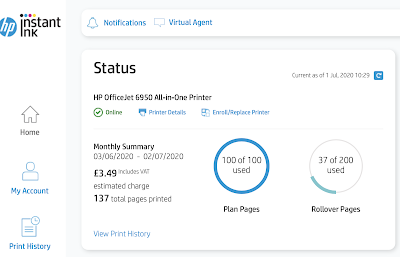 Like many people, I suspect, I have been suspicious of HP's Instant Ink service. The idea is that rather than buy replacement ink cartridges when you need them, HP sends them before you need them and you pay per page. I'm not a heavy user of printing and wondered if it would be a bit like gym membership - you get ripped off because you pay every month but don't use it enough. Even so, I thought it was worth giving it a go - and it has definitely proved beneficial.
Like many people, I suspect, I have been suspicious of HP's Instant Ink service. The idea is that rather than buy replacement ink cartridges when you need them, HP sends them before you need them and you pay per page. I'm not a heavy user of printing and wondered if it would be a bit like gym membership - you get ripped off because you pay every month but don't use it enough. Even so, I thought it was worth giving it a go - and it has definitely proved beneficial.I've opted for a 100 page a month plan, which costs £3.49 a month. Up until now I was typically buying a set of ink cartridges twice a year, which cost about £65 a set - so as long as I don't exceed the limit overall, this means a very significant saving. I do occasionally go over 100 pages in a month as the graphic above from the HP control panel shows - but the system rolls over pages you don't use, so in practice I'm very unlikely to go into the excess, which is charged at £1 for every additional 15 pages.
What is particularly good is that the system works per page, not by amount of ink you use - so there's no need to be stingy about using colour. It has really opened up my use of colour printing, which used to be very tight as printing a page with a lot of colour ate up the colour cartridges.
One obvious worry is that you would run out of ink before HP sent any more. So far, they have been more than careful - I have plenty of spare cartridges waiting to be used. The printer keeps HP updated, so I don't need to request extra cartridges.
If you want to give it a go and have a suitable HP printer (you can check at the HP instant ink website) using that link gives both you and me a free month of ink. I really can't see any reason not to use it - I don't have to faff around ordering cartridges, I'm saving money and I can be more flamboyant with my printing. What's not to love?
May 28, 2020
Review - This is Not a Book about Charles Darwin
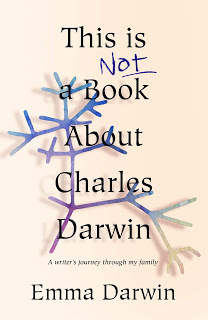 This has to be one of the most unusual books I've ever read. Historical fiction author and creative writing lecturer Emma Darwin takes us on the sometimes painful journey of failing to write a new novel. Along the way we meet many members of the Darwin / Wedgwood / Galton (and co.) clan as Emma (my apologies for using a first name, but to say 'Darwin' in this context would be totally confusing) tries to put together a historical fiction story that incorporates members of her family tree.
This has to be one of the most unusual books I've ever read. Historical fiction author and creative writing lecturer Emma Darwin takes us on the sometimes painful journey of failing to write a new novel. Along the way we meet many members of the Darwin / Wedgwood / Galton (and co.) clan as Emma (my apologies for using a first name, but to say 'Darwin' in this context would be totally confusing) tries to put together a historical fiction story that incorporates members of her family tree.The obvious attraction for potential publishers and readers in such a novel is the Darwin name - Emma is great, great granddaughter of the Charles Darwin - however, she quickly dismisses Charles himself as a subject who is far too well known and takes us instead on a trip around a family tree that features a remarkable number of scientists, artists and other notables. In fact, if anything, it might seem that the struggle would be to find individuals who were dull. In reality, though, the difficulty that forms a thread throughout the book is that the well-known individuals (even featuring one of my musical heroes, Ralph Vaughan Williams) are just too familiar and documented, not giving the wiggle-room that a historical fiction writer needs, while the unfamiliar names tend to be rather, well, ordinary, without enough in their lives to carry a story.
As a writer myself, I find Emma's description of her process fascinating. There surely can't be any branch of fiction that requires so much research as historical fiction (though, to be fair, it seems that Emma is particularly conscientious about this - I suspect there are some hist fic authors who are more cavalier) - it feels more like the depth of research required for a non-fiction book. We are taken into the back room, as it were, experiencing the to and fro with Emma's agent (constantly asking where the story is within the writing), and the whole process is illustrated both with snippets of novel-under-development and photographs - mostly period - as photography is another of Emma's passions.
In the end, after several false starts, the central character seems to be likely to be Imogen, a fictional character (I think - I'll explain why 'I think' in a moment) who becomes entangled with the extended Darwin family. After attempts to make the novel work in various periods, this pushes the story forward to focus primarily on the 1930s. The fact that I have to say 'I think' about Imogen being fictional highlights the only real problem with this book. There are so many characters tried out that I totally lost track of who they are (not helped by a family tendency to reuse first names). At one point, Emma's agent complains about how many characters are introduced in a draft of the novel - it's the same for the meta-book.
Despite the degree of confusion arising from this, the reader gets a fascinating insight into a British dynasty in which pretty well everyone will have heard of a few names, combined with an exploration of Emma's writing process and some of the difficulties writers come up with along the way - including honesty about the requirement to keep money coming in somehow. There's a fascinating conflict between the urge to use the family to get the public interest and the desire not to intrude on real people's lives, especially as the time period moves to one where there may still be living relatives. A truly innovative book.
This is Not a Book about Charles Darwin is available from Amazon.co.uk and Amazon.com



